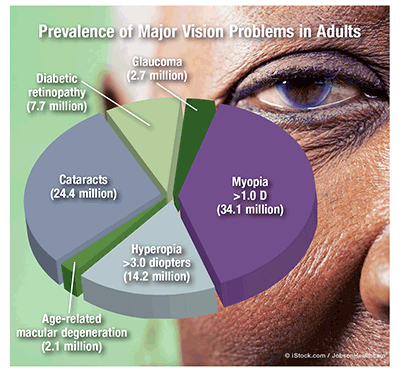Contents
Visual impairment in adults can occur against the background of stress and fatigue, with lack of sleep, diseases of internal organs and excessive visual load.
Together with an expert ophthalmologist Victoria Kuntsevich we discussed the causes and symptoms of visual impairment in adults, as well as methods for treating and preventing vision problems.
Causes of visual impairment in adults
Among the main causes of deterioration in adults, ophthalmologists distinguish:
- Age-related changes in the lens;
- High visual load;
- Influence of adverse environmental factors;
- Smoking;
- Lack of minerals and vitamins;
- Dry eye syndrome.
Separately, I would like to dwell on the last reason – the “dry eye” syndrome, which is called the “disease of civilization”, because it has become more common in recent years.1. This pathology is accompanied by drying of the outer mucous membranes of the eye – the cornea and conjunctiva.
Without adequate treatment, dry eye syndrome can lead to serious complications – reduced sharpness, blurring and blurred vision, as well as pathological changes in the cornea, such as clouding and ulcers.1.
If you notice similar symptoms in yourself, you should immediately contact an ophthalmologist. To determine the visual acuity and field of view, the doctor uses special tables and devices. The examination allows not only to check the quality of vision, but also to detect all disorders and pathologies2.
Symptoms of visual impairment in adults
The main symptoms of visual impairment in adults are the following signs:
- lack of sharpness of vision, blurry contours of objects;
- feeling of dryness, discomfort and “sand” in the eyes;
- lacrimation, itching;
- rapid fatigue with visual stress;
- sparks, dots, stars, veil and flashes in the eyes;
- doubling of objects;
- violation of lateral vision;
- twilight blindness.
Treatment of visual impairment in adults
Treatment of visual pathologies is always selected individually and depends on the severity of symptoms and the rate of progression of the disease.
If the problem is detected in the early stages, wearing corrective glasses and lenses, prescribing vitamin and mineral complexes and special dietary supplements, special exercises for the eyes, as well as pneumomassage and physiotherapy will help.2.
But if time is lost, and conservative treatment is already ineffective, then after examinations, laser vision correction, lens replacement, laser coagulation of the retina, implants and lenses are prescribed.
Prevention of visual impairment in adults at home
Compliance with simple rules will help reduce eye strain and avoid visual impairment.
- Sufficient illumination of the workplace.
- The right glasses for work and play3.
- Compliance with the regime of wakefulness and sleep.
- Warm-ups and exercises for the eyes during work3.
- Preservation of physiological moisture of the mucous membrane of the eyes with the help of special drops and gels.
- Taking vitamin complexes.
- Timely treatment of diseases of the eyes and ENT organs.
- Annual visit to the optometrist.
Popular questions and answers
Popular questions regarding visual impairment and solutions to this problem were answered by ophthalmologist Victoria Kuntsevich.
How to stop the deterioration of vision in adults with age?
There are several universal recommendations for maintaining vision:
• Physical activity and regular walks in the fresh air for 1-2 hours will help the eyes relax;
• Protecting the eyes from solar radiation keeps the retina healthy;
• Breathing exercises improve the blood supply to the brain and have a positive effect on visual acuity;
• To improve the condition of the eyes will help quitting smoking and alcohol, which worsen the blood supply to the retina and damage the optic nerve;
• Hygiene of the eyelids will keep the conjunctiva from inflammation;
• Special gymnastics for the eyes will strengthen the visual muscular apparatus.
What do you need to take to restore vision?
Means for oral administration contain substances that eliminate the effects of oxidative stress – the negative effects of ultraviolet radiation, “blue radiation” from monitors, and malnutrition. Such drugs make up for the deficiency of biologically active substances – vitamins, minerals, amino acids necessary for eye health. These drugs include Strix, Superoptic, Retinorm, Resvega and others.
Modern eye drops are drugs with several mechanisms of action. They improve metabolic processes in the mucous membrane of the eyes and protect it from drying out, have an anti-inflammatory effect, are used to prevent age-related changes, and support damaged retinal vessels in retinopathy. Ophthalmologists can prescribe Vixipin, Emoksipin, Taufon, Vizomitin, Oftan-Katahrom and VitA-POS.
Can vision recover on its own?
The life of a modern person does not contribute to the preservation of vision until old age. Over the years, we see everything worse and catch on only when serious treatment is indispensable. Prevention is of particular importance in this area.
An annual visit to an ophthalmologist will allow you not to miss the onset of eye diseases and may prevent the development of complications.
Are eye diseases hereditary?
Sources of:
- Dry eye syndrome: a disease of civilization. Modern possibilities of diagnostics and treatment. Brzhesky V.V. Medical advice. St. Petersburg, 2013. https://www.med-sovet.pro/jour/article/viewFile/955/955
- Occupational diseases of the organ of vision associated with exposure to physical factors. Babanov S.A. breast cancer. Clinical ophthalmology, 2015, No. 2. https://cyberleninka.ru/article/n/professionalnye-zabolevaniya-organa-zreniya-svyazannye-s-vozdeystviem-fizicheskih-faktorov/viewer
- Roy M. Training for the eyes. A real vision improvement program. Moscow: EKSMO-Press, 2002. https://www.libfox.ru/132138-merilin-roy-training-dlya-glaz-eyesercise.html










